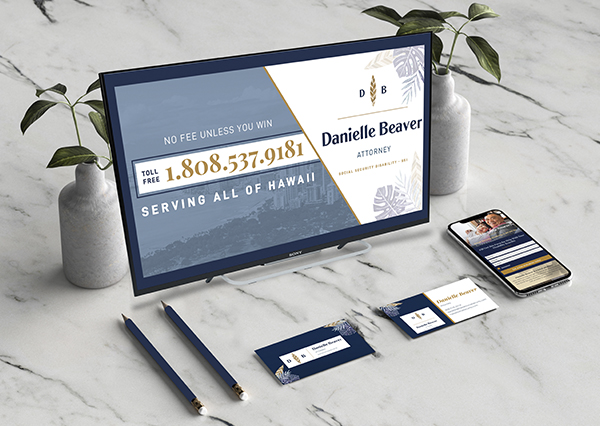Law Firms: How Not To Mistake Advertising and Marketing

People use these two terms in the same breath: advertising and marketing.
But they aren’t the same thing.
When you’re trying to draw more clients to your law firm, you need to understand the difference. Because the success or failure of your law firm advertising depends on your law firm marketing.
So what’s the difference between marketing and advertising?
In a word: strategy.
Marketing is the research and planning you need to identify who your potential clients are and how best to bring them to you.
It encompasses everything from sponsoring community events to making sure your staff is skilled at answering phone calls.
And it includes advertising.
Advertising is, indeed, a major tool you can deploy as part of your legal marketing strategy. It’s not a complete strategy on its own. It’s a specific tactic for reaching an audience.
Your marketing plan can tell you which types of advertising to invest in the most: online advertising, TV ads, billboards, bus ads, print ads or others.
In this blog post, we’ll explain how knowing the difference between marketing and advertising can make a difference in growing your law firm’s revenue.
Law Firm Marketing Means Planning

The first way to tell whether something is marketing, not just advertising, is to look for a thoughtful, wide-ranging plan.
You could view your law firm’s website as a form of advertising. But your marketing plan guides how you structure your site.
It’s best to commit a marketing plan to writing.
Before we launch a website build at our legal marketing agency, we research and create a brief that covers points like these:
- The profile of the law firm’s prospective clients
- An understanding of what those clients are looking for
- The practice areas the lawyers want to grow
- Types of cases the law firm wants to attract
- The geographic areas the law firm wants to reach
- The tone of voice the firm wants to convey
- Points of differentiation with competing attorneys
- Slogans or other lines of encouragement (free case evaluations, no fee unless you win, etc.) that the firm uses across different platforms
- The visual style of the website
- The site’s ultimate goals: generating phone calls, generating case leads through online forms, increasing name recognition, etc.
If you don’t get these and other goals and details written down, it’s amazing how easily something important gets overlooked.
For example: Firmidable once consulted with a firm in Phoenix that previously hired a website vendor to build a new website.
Once the site was live, the partners were unpleasantly surprised to discover that they weren’t getting calls from clients in Tucson.
Why?
Because the web developer simply built them a website (advertising) without first laying out a bigger picture strategy including which geographic areas the firm hoped to serve (marketing).
The lawyers wanted to reach people in Tucson, but this goal wasn’t written down.
So the site ended up without any content on Tucson—and Google had no reason to send people searching for lawyers in Tucson to the site.
Capturing the clients you want, and the revenue that comes with them, requires having them in your plan.
“The person who built the website had no idea they were even interested in Tucson,” said Nathan Chapman, president of Firmidable “They just assumed, ‘Here’s a Phoenix firm, we need to do really well in Phoenix,’ and had no idea what their goals were. That’s the difference between marketing and having somebody execute a specific piece of advertising.”
Legal Marketing Means Discerning Which Form of Advertising to Use
Another way to tell if you’re going beyond basic advertising to accomplish holistic marketing is to look for a comparative evaluation of different types of advertising.
One Firmidable law firm client got pitched on doing digital display advertising by a competing vendor.
Our legal marketing firm produced the law firm’s TV commercials, built their website, runs their search engine optimization (SEO) program and runs their paid search campaigns.
We had previously evaluated online display advertising for the client, comparing it to the other channels, and found it wasn’t our top recommendation for the dynamics of that firm’s market and getting the best return on investment.
Still, the law firm wanted to try display ads, so we built a campaign for them.
The advantage of having us do it? We’ll provide ongoing comparative results from the display ads and all their other forms of advertising, providing more clarity on what direction to take next.
One way to ensure you’re doing savvy marketing—instead of throwing dollars at one-off ad campaigns—is to work with a legal marketing agency capable of managing multiple channels.
A vendor that focuses on certain advertising products will naturally push you toward those.
An agency that takes a wider, marketing-based view of your law firm’s growth, can discern what’s working and what’s not.
“One of the biggest things is the openness, honesty and transparency you can get if you have your marketing under one roof,” said Alex Ludwig, senior account executive at Firmidable. “We want to know what’s best, so we can tell you the truth about what’s best for you.”
Legal Marketing Means You Get Consistency Across Different Channels

A third way to know if you’re getting real marketing, as opposed to disconnected advertising efforts, is to see if your recognizable brand comes across on each platform you use.
Firmidable recently published another blog post on the power of integrated marketing.
Cohesive marketing reinforces your messages, making them more effective at drawing in clients.
These are some of the elements of a well-coordinated marketing strategy:
- Consistent colors applied everywhere
- The same format of the firm name used on all your channels
- The same logo on all your materials
- The same slogan used across your channels
- A distinct tone of voice applied everywhere
As you add new pieces of advertising over time, it’s easy for these elements to get out of whack. Having a central point-person to enforce your brand standards can solve the problem.
Marketing vs. Advertising: Getting the Most for Your Firm
An article from Concordia University-St. Paul in Minnesota defines the discipline of marketing this way:
“Marketing is a process that involves design, creation, research and data mining about how best to align the idea of a product or service with the target audience. Marketing helps to define the product even more than the actual product does.”
This is what it says about advertising:
“Advertising is the literal process of making a product and service known to an audience. It is the description used to present the product, idea or service to the world. This generally entails advertising campaigns in the media.”
For a law firm, the difference between marketing and advertising is the difference between jumping in blindly and planning ahead.
It’s the difference between a tool and a strategy for using that tool.
It’s the difference between uncoordinated efforts and cohesive campaigns.
If you want to discuss a marketing strategy that gets the most out of your advertising, talk to us at Firmidable.
Firmidable has been a national expert in legal marketing for almost 30 years. It brings law firms customized, data-driven marketing strategies and services, including online and traditional media for a wide range of legal practices. From Maine to Hawaii, it has transformed the lives of attorneys—and their clients.

SUCCESSFULLY REPRESENTING CDR & OVERPAYMENT CASES
(Help Your Clients and
Your Bottom Line)
- Why SSD firms decline CDRs & Overpayments
- Why your firm shouldn’t
- A checklist to screen cases you can win
- How to build winning CDR & Overpayment cases
- How to ensure your firm’s fee gets approved
Top SSD Expert Jim Brown.
100% Educational. NOT a Sales Presentation.
